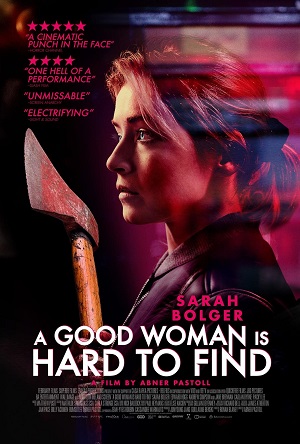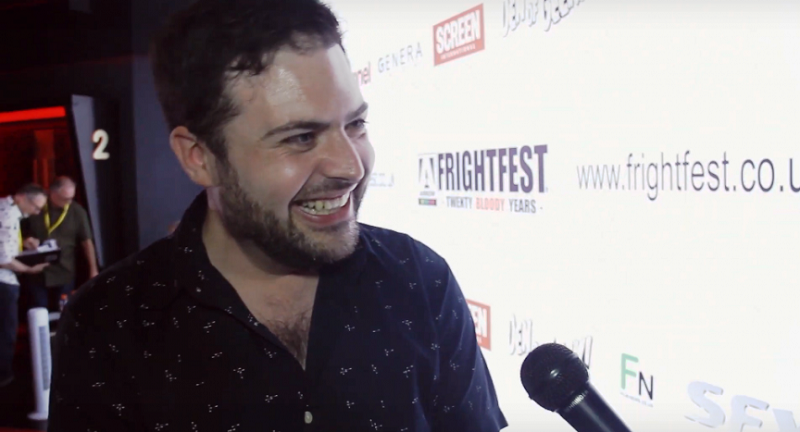
“A Good Woman Is Hard to Find” – Interview with Abner Pastoll
by Sara Michelle Fetters - May 15th, 2020 - Interviews
Going for the Jugular
Abner Pastoll on making A Good Woman Is Hard to Find easy to love
Abner Pastoll’s A Good Woman Is Hard to Find is one of the best films I’ve seen so far this year. A transfixing character-driven thriller, the story follows recently widowed single mothing of two Sarah (Sarah Bolger) who suddenly finds herself smackdab in the middle of a terrifying situation that puts her entire family’s lives in danger.
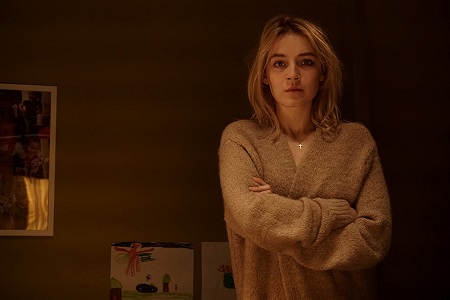
After robbing two of local mobster Leo Miller’s (Edward Hogg) goons of their drug cache, smalltime thug Tito (Andrew Simpson) bursts into Sarah’s house and demands she become his accomplice whether she’d like to or not. Fearful of what he’ll do to her kids, especially her young son who has been mute since he witnessed his father being killed, the young mother initially tries to go along with the intruder’s plans. But when his advances turn more forceful, and when she learns of who it was he stole from, Sarah has to quickly come up with a plan to extricate herself from this situation before it’s too late.
Working from a script by Ronan Blaney and a follow-up to Pastoll’s well-received 2015 thriller Road Games, the movie is a consistently enthralling cat and mouse tale where who is the predator and who is the prey is constantly in flux. Anchored by a stellar performance from Bolger and a mesmerizing sense of time and place, A Good Woman Is Hard to Find is a source of a consistent delight, this entertaining go-for-broke slice of pulp fiction going for the viewer’s jugular right from the very first frame.
I sat down with Pastoll over Skype to chat about his film. Here are some edited excerpts from our energetic and lively conversation:
Sara Michelle Fetters: I’m curious. That opening image that you start with, it’s just so transfixing. When did you decide to have that image of Sarah be presented right there at the beginning? Before we have even the faintest clue as to what the story was going to be? I have to imagine that wasn’t how things began in the script.
Abner Pastoll: You’re right. It didn’t.
It was on the final day of the shoot and we were shooting the shower scene that takes place in the middle of the movie. Sarah Bolger was leaning against the wall as we were setting up a shot in the bathroom. I was just talking to my cameraman, and we’re like, that looks amazing. Why don’t we turn the camera around? I spoke to Sarah and we said, “Why don’t we get this moment of you just staring into the middle of nothing, just lost in thought?”
And we went and we shot it. When we wrapped for lunch on that last day, and I was looking at the footage and I just remember thinking, wow, that’s our new opening for the film. That’s how I discovered it. Right there. Right then. Completely by chance.
Sara Michelle Fetters: I love stories like this. Filmmaking is such a collaborative process, and for you all to realize at that moment what Sarah was doing was extraordinary, and then to go and capture it, that had to feel pretty great.
Abner Pastoll: It’s an amazing feeling. Especially, because like I said, that was our very last shooting day. By that point, Sarah was very much that character. So just by her leaning against the wall and looking into the distance, it was like watching the actual character doing her thing at that particular moment in time.
Sara Michelle Fetters: Backing up a little, Ronan’s script, where did it come from? How did this get to you and when did you know that this was going to be your follow-up to Road Games?
Abner Pastoll: It was actually one month before the world premiere of Road Games. I was looking for a writing partner because I had a few ideas of things that I was working on and a few things I wanted somebody else to write with me. My producer reached out to an agent in the UK and asked if he had some writing samples from some of his clients. He sent us over five scripts, and one of those was for A Good Woman Is Hard to Find by Ronan Blaney. It blew me away. It was completely unexpected, and I had no idea if it was even available. So we asked if it was, because not only is Ronan a writer I wanted to collaborate with, but I wanted to make this script.
It turned out that he had just finished writing that script a few days before I had read it. I was the first person to even read it other than his agent. It was fate. I just felt like this was a movie I needed to make. This leaped into my life and took over everything. Basically since that first moment I’ve just been focusing on it.
Sara Michelle Fetters: How did you tear apart what Ronan had created so that you could bring your own voice to the material? What was that collaboration like?
Abner Pastoll: The key element was who to cast. When I read the script, Sarah Bolger is pretty much the only person I could see in the lead role. So, first of all, it was making sure that I had the right cast. That was key.
I sent Sarah the script and she really connected with it. Within 24-hours of sending it to her we were on a Skype video call discussing the character and the story. I just knew we were on the same page. I cast her in the film, but it was about 18 months before we got to shoot. So she was involved in the project for a long time. I spent a lot of that time working with her to find the voice of the character and to elevate the script even further above what Ronan had so beautifully written.
Sara Michelle Fetters: So, in some ways, that time was almost like your rehearsal period. I think I read somewhere you shot all of this in some crazy compressed time frame? Like somewhere between 16 and so days?
Abner Pastoll: Yes. That’s a great way to look at it.
We were supposed to shoot in 20 days, but one week before we were due to start principal photography we had to cut our schedule by four days due to a miscalculation in the budget because this was a co-production between the UK and Belgium. Half the film was shot in Northern Ireland and half the film was shot in Belgium on a soundstage.
Unfortunately, that set was slightly more expensive than originally estimated. There was an error in our budget file and we had to cut back on some shooting days. At that point I thought, it’s already tight to get all of this done in 20 days and I’m sure we can do it in 19.
I remember that moment so clearly. They were like, “No, we’re not cutting one day. We have to cut four days.” I was floored. I honestly had no idea how we were going to shoot this film in 16 days. But we did it! By some miracle, we got through it.
Sara Michelle Fetters: And so all that prep work you and Sarah did beforehand likely paid off.
Abner Pastoll: Indeed! Absolutely. I think the reason the film succeeds is because we had so much time to develop the character. Even during the shoot, we would wrap our shooting day and then go back to our hotel and sit in the lobby, drink tea in the evening and discuss everything that we had already done and what we’re going to be doing tomorrow. Just making sure that the scenes made sense and that we cut out any repetition.
That’s one thing that we kept finding in the script. There were moments that might’ve been a bit too repetitive. This was a way to streamline the process. I know this helped quite a lot.
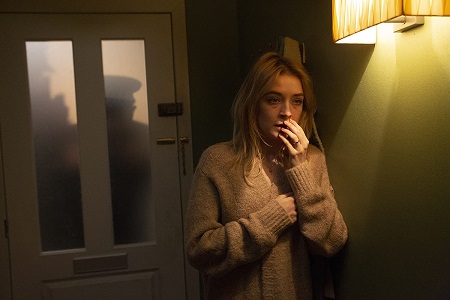
Sara Michelle Fetters: That’s so crazy that you say that because one of the things that impressed me so much about the film is how little fat it has, how little expositional excess there is. Early on, there’s that scene where Sarah goes into the police department to check on her husband’s case. We don’t need a lot of dialogue there. It’s all pretty much said in the looks that that pass between the desk sergeant and Sarah.
Abner Pastoll: Right. You get what you need from that moment, nothing more.
Sara Michelle Fetters: I’m sure there was plenty of material that you wanted to shoot, or maybe even did shoot, and loved. How hard is it to sit there and realize you don’t need those moments, no matter how personally attached you might be to them, understanding the film will be better without them? How difficult is it to make those decisions?
Abner Pastoll: You have to go with your gut instinct, and sometimes you don’t always make the right decision. There isn’t really a right or wrong, it’s more based on the feeling of what you think suits the story or the character. It can be difficult. There were a couple of moments that got cut out of the film that I thought were great but they just slowed the film down or they didn’t quite work. That’s always hard.
But there was a lot of stuff that got cut before we even shot it because we could tell beforehand that it wasn’t going to go into the film. While there are a couple of scenes or moments that got cut down or even cut completely from the film, there were plenty of scenes that were in the script that we didn’t even shoot.
Sara Michelle Fetters: As crazy and as violent as it becomes, there’s an inherent playfulness to Road Games. A Good Woman Is Hard to Find isn’t playful, yet you can’t take your eyes off of it and it is still every bit as entertaining as your prior film. What was that like for you? Because I feel like you have this Hitchcockian glee about things, at least that’s what I took away from Road Games, and that you find a malevolent happiness in some of the crazy goings-on. But this movie is a lot more straightforward. This movie goes for the jugular right from the jump.
Abner Pastoll: I think some of that comes from my being slightly frustrated by a couple of things in Road Games that were misunderstood by some people. I just thought, f-it. I’m going to go for the jugular this time. Take no prisoners. I think that’s probably what happened.
Sara Michelle Fetters: I read somewhere you were pretty much raised in a movie theater. Your parents owned a theater. Road Games, internationally at least, really did play very well theatrically. Because of circumstances well beyond anyone’s control, is it still a little strange that this film, which would probably have a really strong indie theatre theatrical shelf life, is probably only going to get seen in a non -theatrical setting?
Abner Pastoll: I’m just happy that people will be able to watch the movie. I think that people are stuck at home because of quarantine and at least they have the option to see the movie. To be stressed out by it or be entertained by it depending on the type of person who is watching. I do think we had a pretty successful festival run, so it did get seen with big crowds and many theaters in a few different countries. That was nice. It was interesting and fun to experience the different reactions.
I do think it would have been worse if we didn’t have the option of streaming or this “virtual cinema” that Film Movement is doing because otherwise it wouldn’t get seen at all. I think that we have this as a backup, it’s a good thing. For right now. In the interim. While we figure out what’s going to happen next.
Because we don’t know when we can return to see movies in theaters again. I know I’m definitely having withdrawal symptoms from not being able to go and see movies, but I’m keeping myself entertained at home best I can. Watching tons of stuff online. It’s better than not being able to see anything at all, you know?
Sara Michelle Fetters: What I think is amazing, and it hasn’t just been you and it hasn’t just been Barbara Crampton, what has been interesting to me is seeing how many filmmakers are embracing people viewing their films at home and interacting with them on social media while they all watch together. What’s that experience been like? It seemed to me like you guys had a blast doing that with Road Games. What’s that been like for you as a filmmaker having that sort of interaction with your fans?
Abner Pastoll: It’s great fun. In the years since making Road Games I’m constantly surprised by all of these new fans that keep coming out of the woodwork. There are so many people that like the movie that I didn’t even realize liked it. It’s great fun interacting with people and having that shared experience. I have noticed there have been many of these Twitter watch parties, and I think it’s a good way to embrace fans and spend time together whilst we’re all stuck apart.
Sara Michelle Fetters: And is that something you want to do with this film as well?
Abner Pastoll: I think that would be cool. I would prefer, obviously, that people watch it for the first time without having the distraction of having a live-tweet. But I’d be quite happy to do that, yeah. I’m looking forward to it.
Sara Michelle Fetters: I admit, it was a little disconcerting for me looking at Sarah in this, only because I have such vivid memories of her from In America. Seeing Sarah with children that are roughly the same age as she was when she made that movie freaked me out a little.
Abner Pastoll: Right? It’s pretty crazy. I know what you mean. But she’s just so talented. I think people forget just how talented she was from such an early age and continues to be now.
Sara Michelle Fetters: What did she bring to the material?
Abner Pastoll: A lot. More than I can say.
One major change that wasn’t so obvious in the script, but it’s much more apparent in the final film, is it feels much more about grief and its lingering effects than it did on the page, and that’s because of Sarah’s performance. She really brought that out.
But she brought so much. I think that the film works because of Sarah’s performance. She keeps it so grounded in reality. Even though it goes to places that are at times, especially towards the end of the film, this heightened form of reality, that isn’t necessarily realistic, she manages to make it believable. That’s all Sarah Bolger. I can’t imagine another actor in this role. It wouldn’t have been as successful.
Sara Michelle Fetters: You also bring back Andrew Simpson. I don’t want to talk too much about him because I think it would be a spoiler to elaborate too much, but how much fun was it to work with him again in a role that has some similarities to what he did in Road Games but at the same time is wildly different in some fairly specific ways?
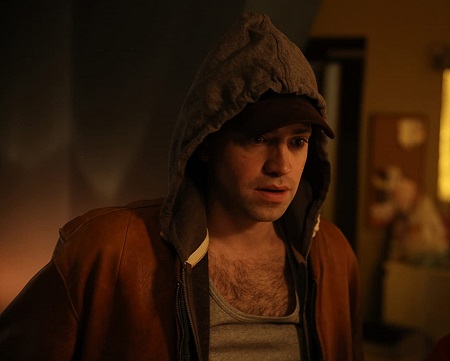
Abner Pastoll: I think one of the main reasons why I cast him was to show another side to his acting abilities, to show his range. Tito is pretty much the polar opposite of who Jack was and what Road Games is. Very, very different. But there are those tiny similarities that I think are basically down to Andrew himself, that he manages to connect the two characters.
I just really love working with him. We have that shorthand from having worked together already. It kept things simple, especially when we had such a tight schedule for shooting. We knew each other’s rhythms and pacing. I didn’t have to spend too much time trying to get him to do this or to do that. I just let Andrew go a little bit wild with the character because I trusted him. It was really fun to work with him again, to let him shine and show a different side to his acting ability.
Sara Michelle Fetters: I also want to give you a couple of seconds to talk about Edward Hogg. Freaking hell is he terrifying in this.
Abner Pastoll: Ha! He’ll be happy to hear that you said that. He’s the loveliest guy.
He’s actually one of my best friends. I’ve known him now for 10 years. We did a short film together and became really good friends in the years since. I thought he would be an amazing choice for this role and it was great to be able to collaborate. I let him be terrifying because he’s really not terrifying at all in real life. He did have a cameo in Road Games. I don’t know if you remember that.
Sara Michelle Fetters: I do. And I love that you give him a screen credit for it.
Abner Pastoll: He was grateful that I gave him a more significant role than a dead body this time. [laughs]
One of the things I loved about his performance is he gave a completely different dynamic to the character of Leo Miller than that was on the page. He made him much more of a psycho. He made him much more of an unpredictable psychotic nutcase. Whereas on the page it was almost just a typical gangster, I think Ed elevated that craziness by his facial expressions, body movements and his maniacal laughter. He added that scary edge through the unpredictability of his performance.
Sara Michelle Fetters: How important was it to make the neighborhood, Sarah’s neighborhood that she lives in with her kids, a third or fourth character in the film? I felt like the location became just as big an item to keep an eye on, and worthy of our emotional investment, as the main character was.
Abner Pastoll: Thank you for saying that. My approach when I make a movie is to treat the location, as well as things like sound and music, all as their own characters. I think this is important to give things a sense of place. It’s just as important as making a character relatable. I think it’s very much intentional to have that feeling of the location being a character.
Sara Michelle Fetters: At the end of the day, what do you want audiences to take away from the film? What do you hope they’re talking about?
Abner Pastoll: I hope they’re talking about how amazing Sarah Bolger is. I think in that sense it’s already succeeded. But I hope that they get some enjoyment out of it. People react in different ways, and that’s how it should be. But while this is a more a societal thing than a movie thing, I’d ultimately love for people to take women more seriously. That would be great.
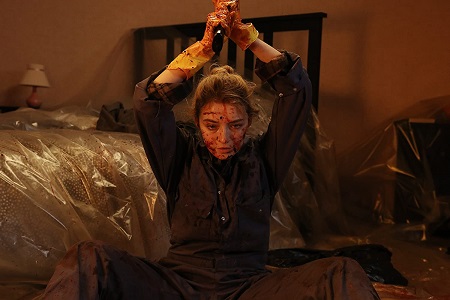
Sara Michelle Fetters: One last thing before I let you go. I brought it up on Twitter and I’m going to bring it up here, too. Is it now your trademark to have these extraordinary end credit tracking shot set to really awesome music?
Abner Pastoll: [laughs] You will be happy to know that you are the first to notice that. You can say you were the one who called it.
Sara Michelle Fetters: Love it. Thank you! It’s a great way to make sure people stay through the credits. And, in the case of both Road Games and now this film, they’ll be happy they did.
Abner Pastoll: Road Games and A Good Woman intentionally don’t have any opening credits, and they both have the credits at the end with the drone shots and aerial shots. It is very much intentional and part of my style. In both cases, I just wanted to get straight into the story and not waste time with being distracted by text or anything. Having this stuff at the end, I think it both fits the films and adds a fun little extra fans will hopefully enjoy.




